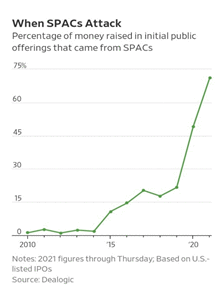CKBlog: The Market
Thursday, January 28, 2021
SPAC Attack
by Steve Haberstroh, Partner
Special
Purpose
Acquisition
Company

SPACs are all the rage. So why all the hype?
Definition: A special purpose acquisition company (SPAC), also known as a “blank check company,” is a company with no commercial operations that is formed strictly to raise capital through an initial public offering (IPO) for the purpose of acquiring an existing company.
-Investopedia
A blank check company? Sign me up!
In layperson’s terms, a successful investor, executive, expert, charlatan creates a company, invests some of his/her own money into that company, then lists it on an exchange looking for other investors to purchase the stock in an effort to raise money for some unknown future acquisition. If no transactions take place over a certain period of time (usually two years), the funds are returned to investors and the company is liquidated.
The successful investor, executive, expert, charlatan is also given a certain percentage of future profits, (usually 20%) for their “expertise” and deal making. While many very qualified investors such as Bill Ackman, Chamath Palihapitiya, and Barry Sternlicht have all issued SPACs, it seems everyone and their mother are bringing SPACs to market as of late.
Shaq has a SPAC. Former House Speaker Paul Ryan has a SPAC. Jay Z has a marijuana SPAC. From business people to actors, the rush is on. From the New York Times, “242 SPACs were introduced this year (2020), four times the number raised last year, according to SPAC Insider. The average size of a SPAC in 2020 was $335 million, nearly 10 times the amount in 2009.” According to Dealogic, over $82 billion was raised via SPACs in 2020, an amount greater than all the funds raised since blank check companies first hit the scene decades ago.
What’s behind this surge? For one, that 20% share of future profits makes it very attractive for these so-called experts to bring these deals to the public markets. Second, due to some recent success stories in the electric vehicle space (in search of the next Tesla), investors in SPACs have seen substantial and rapid gains. Third, with rates so low and stimulus checks deposited, many investors are flush with cash looking for the next “big thing.”
It has gotten so extreme that many SPACs trade 25%, 50%, or even 100% higher on their first day of trading purely based on the reputation of the SPAC sponsor. Why wouldn’t I would want to invest alongside rap mogul and No Limit Records founder, Master P?! It’s true, he and former NBA star Baron Davis have a SPAC with big plans.
According to Bloomberg, Master P’s SPAC, named Bull Horn Holdings Corp, completed a $75 million raise in November “for the purpose of effecting a merger, share exchange, asset acquisition, share purchase or similar business combination with one or more businesses ... the Company intends to focus on leading sports, entertainment, and brand companies that have a potential for brand and commercial growth.” The chatter is Bull Horn is eyeing sneaker brand Reebok as a potential target.
Many of these investments will be longer term winners, but most will fail. So while the recent SPAC rush has been lucrative, investors should proceed with caution. Sure, Shaq may find the next Nike but there is a decent chance many of these SPACs never find a worthwhile deal. Or worse, after sitting in cash for two years they may make a terrible deal.
As the clock winds down, will the sponsor act prudently and return money to investors? Or will they make a subpar acquisition to maintain the longshot payday? If they are successful, you pay them 20% of the profits. If they aren’t, you eat the losses.
Time will tell how this will end. But like Master P’s record label, there seems to be no limit of funds rushing into this space.




